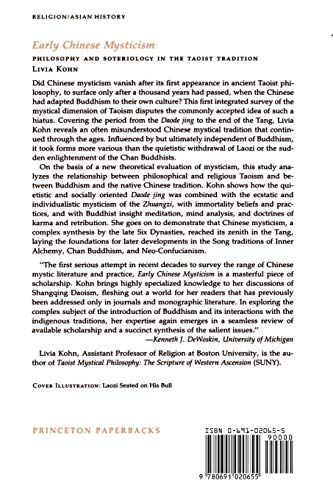Customer Services
Copyright © 2025 Desertcart Holdings Limited



Full description not available
A**H
A crucial, balanced history of Taoism
This is an excellent history and treatment of the mystical tradition in Taoism up through the Tang period, written from a scholarly perspective. It gives the broad contours of the mystic experience and provides a survey of the literature. Specifically, it takes up the philosophical tradition (Tao Te Ching, Chuang Tzu, Lieh Tzu, etc.), the shamanic/ecstatic thread (Chuci, the "flight to the stars" etc.), Shangqing Taoism, Guo Xiang, the so-called "Hedonistic" tradition of Yang Zhu, Twofold Mystery, meditation, cross-currents with Buddhism, and much, much more. It also engages with some lesser-trodden but nonetheless important texts like 'The Scripture of the Western Ascension'. In my opinion, this is an indispensable book for anyone with an interest in Taoism. Aside from being extremely informative, its importance lies in its emphasis on the traditions listed above. So often, contemporary western books on Taoism vaunt internal alchemy, but this crucial history by Kohn reminds us that Taoism is so much more than that. Having said this, it might actually have been nice if she had in fact explored alchemy here too (it gets only a couple of brief mentions), and contextualized it alongside the more dominant aspects of Taoism that she does explore. However, one notes that Kohn later co-edited a volume on Internal Alchemy, which is also well worth the read. This, though, should be anyone's starting point for the history of Taoism.
A**R
Three Stars
Informative but does not show a deep understanding.
C**X
"Coming out of the hidden and returning thereto"
If one is determined to explore the richly complex world of Taoist religiosity, best to choose one's guides wisely. And one of those guides should definitely be this excellent study by Livia Kohn. After some basic groundwork conceptually clarifying the term "mysticism" itself, avoiding the fuzziness this term sometimes attracts, Kohn goes on to elucidate the distinctively specific characteristics of Taoism (China's brand of mysticism, as it were), untangling many confusing points by analyzing it into several constituent streams and tracing their multifarious mutual interactions over the centuries and eventual sophisticated synthesis during the Tang dynasty, using a judicious selection of key texts to make her case and so avoiding the bibliographic excess that sometimes muddies the waters in this kind of overview. Key points of interest for me were the role of some rather tipsy poets in the evolution of Taoism's shamanistic ecstatic facet and the brilliantly nuanced & informative discussion of Taoism's fruitful yet fraught interaction with and appropriation of Buddhist ideas and practices, but the book as a whole is a much-needed steady handhold to gain a holistic grasp of a fascinating spiritual tradition.
S**N
Illuminating and Informative
This book is excellent for anyone with a serious interest in Chinese religions. It traces the development of Chinese mystical thought and practice from the earliest mystical and philosophical writings up through the Tang dynasty. In addition to its appeal to the scholarly community, anyone who has read and enjoyed some of the works of Chinese mysticism will find that this book provides a background in which to better understand what they have already read as well as exposing them to works they are not yet familiar with. All in all an excellent read.
Trustpilot
3 weeks ago
1 week ago